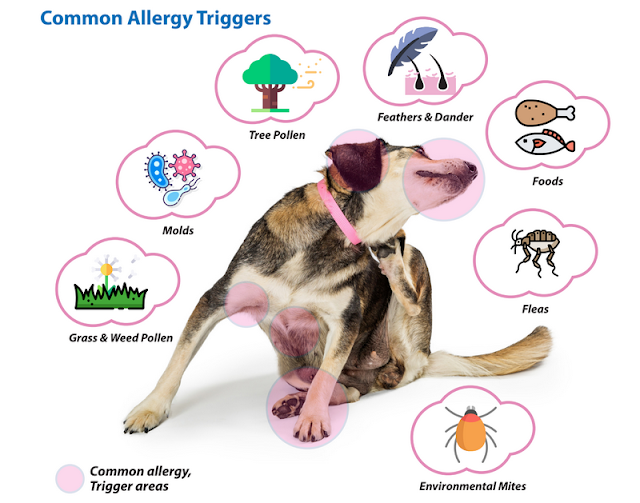Pet allergies are common among individuals, causing discomfort and health issues. In this guide, we will explore the various types of pet allergies, their symptoms, and effective ways to manage them, ensuring your beloved pets remain comfortable and healthy.
Common Types of Pet Allergies
1. Dander Allergy
Dander, tiny flakes of skin shed by cats, dogs, and other animals, is a significant allergen. It can trigger allergic reactions in sensitive individuals.
2. Saliva Allergy
Pet saliva contains proteins that can cause allergies. When pets groom themselves, these proteins can spread to their fur and skin, leading to allergic reactions.
Also read: Pets Passport : New rules and future changes
3. Urine Allergy
Urine from pets, especially cats, can be another source of allergens. Allergies to pet urine are typically triggered by proteins present in the urine.
Symptoms of Pet Allergies
Sneezing and a runny or stuffy nose
Itchy or watery eyes
Skin rashes or hives
Coughing and wheezing
Shortness of breath or difficulty breathing Managing Pet Allergies
1. Regular Grooming
Regular grooming is a fundamental aspect of managing pet allergies. It helps to reduce the amount of dander and allergens present in your pet's fur, which are common triggers for allergic reactions. Here's how you can incorporate regular grooming into your pet care routine:
Brushing: Regularly brush your pet's fur to remove loose hair and dander. Use a brush that's suitable for your pet's coat type to effectively remove allergens.
Bathing: Giving your pet regular baths can help remove allergens from their skin and fur. Use a hypoallergenic pet shampoo recommended by your veterinarian to minimize potential allergic reactions.
2. Clean Living Spaces
Creating a clean living environment is essential in managing pet allergies, as it helps minimize exposure to allergens within your home. Here are steps to maintain a clean living space:
Regular Cleaning: Clean your home regularly, including vacuuming carpets, upholstery, and floors. Use a vacuum cleaner with a HEPA filter to effectively trap pet allergens.
Bedding and Upholstery: Wash your pet's bedding and any other upholstery or fabric that your pet comes into contact with, such as cushions or blankets. Use hot water and allergen-reducing laundry detergent.
Air Purification: Consider using air purifiers with HEPA filters in your home, especially in areas where your pet spends a lot of time. These filters can help trap pet allergens and improve air quality.
3. Allergy Medications
Consulting a veterinarian or allergist for appropriate allergy medications for your pet is crucial in managing their allergies effectively. They can prescribe medications to alleviate allergic reactions. Common types of allergy medications for pets include:
Antihistamines: These medications can help control itching, sneezing, and other allergy symptoms in pets.
Corticosteroids: Corticosteroids may be prescribed to reduce inflammation and control severe allergic reactions in pets.
Immunotherapy (Allergy Shots): In some cases, allergists may recommend immunotherapy, a series of injections that expose your pet to small amounts of allergens to help them build tolerance over time.
4. Hypoallergenic Pet Products
Hypoallergenic pet products are specially designed to reduce allergens and minimize allergic reactions. Incorporate these products into your pet care routine to help manage allergies:
Hypoallergenic Pet Shampoos: Use hypoallergenic shampoos designed for pets with sensitive skin to minimize skin irritations and allergies.
Hypoallergenic Detergents: Wash your pet's bedding and any fabric they come into contact with using hypoallergenic detergents to reduce allergens.
Hypoallergenic Cleaning Products: Utilize hypoallergenic cleaning products to clean your home and pet's living areas, reducing exposure to allergens.
5. Consult a Professional
If pet allergies persist or worsen despite implementing the above measures, it's essential to seek guidance from a veterinarian or allergist. They can conduct comprehensive allergy testing to identify specific allergens affecting your pet and recommend personalized treatment options accordingly. Professional guidance is vital in managing severe or persistent pet allergies effectively.
3. Urine Allergy
Urine from pets, especially cats, can be another source of allergens. Allergies to pet urine are typically triggered by proteins present in the urine.
Symptoms of Pet Allergies
Sneezing and a runny or stuffy nose
Itchy or watery eyes
Skin rashes or hives
Coughing and wheezing
Shortness of breath or difficulty breathing Managing Pet Allergies
1. Regular Grooming
Regular grooming is a fundamental aspect of managing pet allergies. It helps to reduce the amount of dander and allergens present in your pet's fur, which are common triggers for allergic reactions. Here's how you can incorporate regular grooming into your pet care routine:
Brushing: Regularly brush your pet's fur to remove loose hair and dander. Use a brush that's suitable for your pet's coat type to effectively remove allergens.
Bathing: Giving your pet regular baths can help remove allergens from their skin and fur. Use a hypoallergenic pet shampoo recommended by your veterinarian to minimize potential allergic reactions.
2. Clean Living Spaces
Creating a clean living environment is essential in managing pet allergies, as it helps minimize exposure to allergens within your home. Here are steps to maintain a clean living space:
Regular Cleaning: Clean your home regularly, including vacuuming carpets, upholstery, and floors. Use a vacuum cleaner with a HEPA filter to effectively trap pet allergens.
Bedding and Upholstery: Wash your pet's bedding and any other upholstery or fabric that your pet comes into contact with, such as cushions or blankets. Use hot water and allergen-reducing laundry detergent.
Air Purification: Consider using air purifiers with HEPA filters in your home, especially in areas where your pet spends a lot of time. These filters can help trap pet allergens and improve air quality.
3. Allergy Medications
Consulting a veterinarian or allergist for appropriate allergy medications for your pet is crucial in managing their allergies effectively. They can prescribe medications to alleviate allergic reactions. Common types of allergy medications for pets include:
Antihistamines: These medications can help control itching, sneezing, and other allergy symptoms in pets.
Corticosteroids: Corticosteroids may be prescribed to reduce inflammation and control severe allergic reactions in pets.
Immunotherapy (Allergy Shots): In some cases, allergists may recommend immunotherapy, a series of injections that expose your pet to small amounts of allergens to help them build tolerance over time.
4. Hypoallergenic Pet Products
Hypoallergenic pet products are specially designed to reduce allergens and minimize allergic reactions. Incorporate these products into your pet care routine to help manage allergies:
Hypoallergenic Pet Shampoos: Use hypoallergenic shampoos designed for pets with sensitive skin to minimize skin irritations and allergies.
Hypoallergenic Detergents: Wash your pet's bedding and any fabric they come into contact with using hypoallergenic detergents to reduce allergens.
Hypoallergenic Cleaning Products: Utilize hypoallergenic cleaning products to clean your home and pet's living areas, reducing exposure to allergens.
5. Consult a Professional
If pet allergies persist or worsen despite implementing the above measures, it's essential to seek guidance from a veterinarian or allergist. They can conduct comprehensive allergy testing to identify specific allergens affecting your pet and recommend personalized treatment options accordingly. Professional guidance is vital in managing severe or persistent pet allergies effectively.
Fore more read Our others Post on :Pets lover and clinic













0 Comments